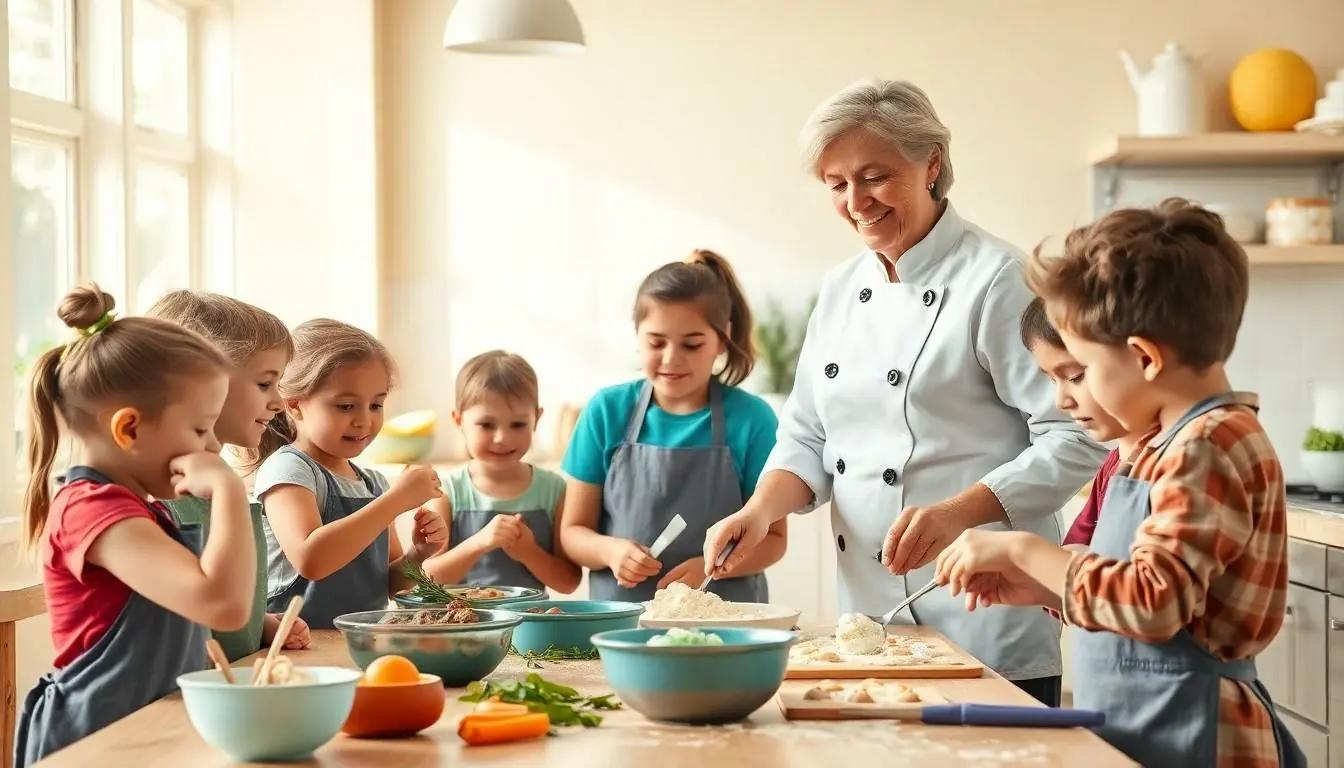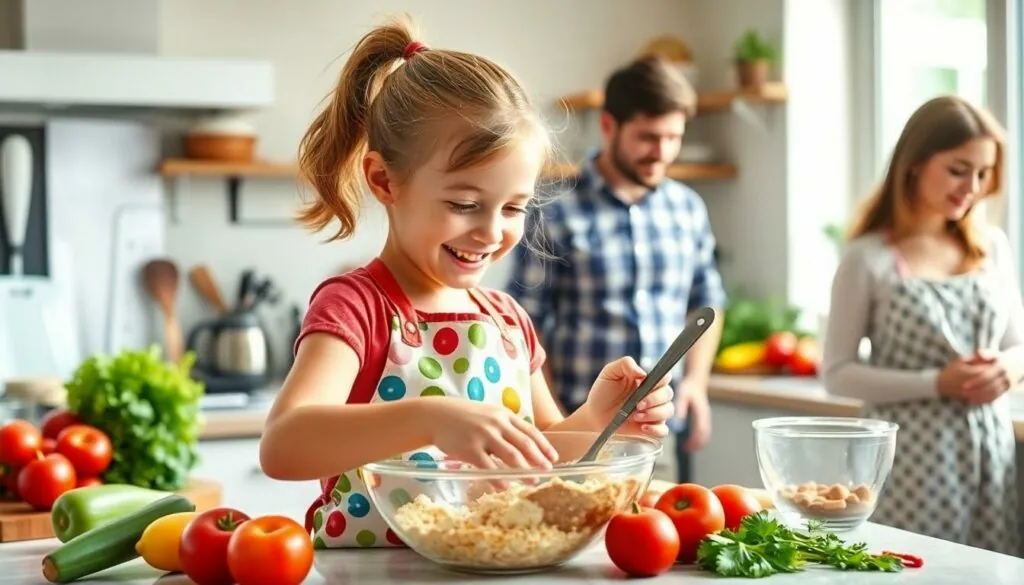Imagine your little chef whipping up a culinary masterpiece while you sit back and enjoy the aroma wafting through your home. A kids cooking class nearby could turn that dream into reality. Not only do these classes teach essential kitchen skills, but they also spark creativity and confidence in young cooks.
Table of Contents
ToggleBenefits Of Kids Cooking Classes
Kids cooking classes offer numerous advantages, including the enhancement of essential kitchen skills and the promotion of creativity.
Skill Development
Cooking classes equip children with practical skills, such as measuring ingredients and following recipes. They learn to chop vegetables, sauté, and bake, introducing them to various cooking techniques. Understanding kitchen safety and hygiene emerges as a vital component of these classes. Children gain knowledge about different types of utensils and how to use appliances, which enhances their independence in the kitchen. Engaging in hands-on activities teaches them to plan and prepare meals, cultivating organizational skills. Coordination improves as they learn to multitask during cooking sessions, fostering a sense of accomplishment with each completed dish.
Confidence Building
Cooking allows kids to express themselves creatively, boosting their self-esteem. As children prepare meals, they gain a sense of ownership over their culinary creations. Positive reinforcement from instructors and peers strengthens their confidence further. Completing a recipe successfully encourages children to attempt new dishes, expanding their culinary repertoire. Sharing their creations with family or friends provides an additional confidence boost and nurtures social skills. Participating in group cooking activities fosters teamwork and communication, creating a supportive environment where children thrive.
Key Features To Look For

Choosing the right kids cooking class involves evaluating specific features that enhance the learning experience. Parents should prioritize these elements to ensure an enriching environment.
Curriculum Variety
Look for classes offering diverse curricula. Engaging options may include baking, international cuisine, or seasonal cooking themes. Variety keeps children interested and expands their culinary knowledge. Classes can include hands-on activities that make learning enjoyable. Cooking classes with emphasis on nutrition teach children the importance of healthy eating. Courses often cater to different skill levels, allowing kids to progress at their own pace. Parents appreciate classes that introduce cultural elements through cuisine, broadening their children’s perspectives.
Instructor Qualifications
Verify the qualifications of the instructors. Experienced chefs provide valuable insights through their culinary expertise. Familiarity with child development enhances an instructor’s ability to engage and motivate young learners. Instructors should possess teaching certifications or relevant culinary degrees. Their ability to create a safe and supportive learning environment is critical for fostering confidence. Classrooms led by knowledgeable instructors encourage creativity, allowing children to experiment with flavors and techniques. Parents often look for instructors with positive reviews and proven success in teaching young students.
Popular Kids Cooking Classes
Finding a suitable kids cooking class can significantly enhance a child’s culinary journey. Various options exist, catering to diverse interests and goals.
Local Options
Community centers and culinary schools frequently host kids cooking classes. These classes often focus on fundamental cooking skills while providing hands-on experience. Local businesses, including cooking studios and specialty shops, tend to offer themed workshops, such as baking or holiday dishes. Parents can explore classes that emphasize nutrition, helping children learn about healthy eating. Furthermore, many local classes foster team collaboration through group activities, making learning enjoyable. These classes typically accommodate various age ranges, ensuring every child engages at an appropriate skill level.
Online Alternatives
For those preferring online options, virtual kids cooking classes offer flexibility and convenience. Numerous platforms provide interactive sessions, allowing children to cook alongside experienced chefs from home. Classes often focus on specific cuisines or techniques, providing a broad culinary education. Parents can find classes that cater to different skill levels and time availability, ensuring an engaging experience for all. Additionally, many online courses offer recorded sessions, enabling children to revisit techniques and recipes as needed. This format provides an excellent opportunity for kids to cultivate their culinary skills without leaving home.
What To Expect In A Class
Participants can look forward to an engaging, interactive experience in kids cooking classes. Children often develop practical skills while working on fun recipes.
Typical Class Structure
Classes usually start with an introduction to the day’s recipe and a review of necessary kitchen tools. Instructors demonstrate techniques step-by-step, ensuring children grasp key concepts before they begin cooking. Each session incorporates hands-on practice, allowing kids to measure, chop, and mix ingredients under supervision. The structure often includes discussions about nutrition and food safety, providing essential knowledge alongside cooking skills. Classes conclude with an opportunity for students to share their dishes, enabling them to celebrate their achievements while reinforcing social skills.
Age Group Considerations
Age plays a significant role in class design and expectations. Programs tailored for younger children tend to focus on basic skills, fostering creativity through simple recipes. Older kids typically engage in more complex cooking techniques and learn about diverse cuisines. Class groups often reflect these age distinctions, ensuring appropriate challenges for each level. Instructors adapt activities and communication strategies based on age, enhancing engagement and comprehension. Classes welcoming various age groups may incorporate team projects, encouraging mentorship among participants while promoting collaboration.
Finding the right kids cooking class can open up a world of culinary adventure for children. These classes not only teach essential cooking skills but also nurture creativity and confidence in young learners. With a variety of options available, from local community centers to online platforms, parents can choose the best fit for their child’s interests and skill level.
As kids engage in hands-on cooking experiences, they’ll develop a sense of independence and teamwork while enjoying the process of creating delicious meals. Investing in a kids cooking class is a step toward fostering a lifelong love for cooking and healthy eating.




